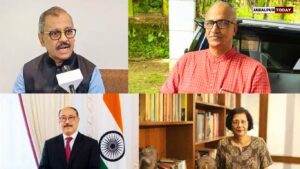Symposium Highlights Bhatt’s Enduring Impact on Literature, Journalism, and Social Reform
A distinguished symposium titled “The Literature of Balakrishna Bhatt” was recently held at P.G.D.A.V. College (Evening), jointly organized by the Authors Guild of India and the Delhi Hindi Sahitya Sammelan. The event featured insightful discussions by leading scholars focusing on Bhatt’s multifaceted contributions to Hindi literature, journalism, and socio-cultural thought.
The program opened with a welcome speech by veteran journalist Mr. Dilip Chaube, who hailed Bhatt as a foundational figure in Indian journalism. Chaube highlighted that Bhatt’s courageous and principled writing laid the groundwork for the bold journalistic practices seen today.
Prof. Harish Arora, a prominent Hindi scholar from the University of Delhi, delivered the keynote address. He explored Bhatt’s literary vision, his deep historical awareness, and his unwavering social commitment. Arora described Bhatt as a master craftsman of Hindi prose and poetry, whose works uniquely balanced rationality and emotion, positioning him as a key ideological leader of the Bharatendu era.
Dr. Vijay Shankar Mishra drew parallels between Bhatt’s intellectual prowess and that of notable Western thinkers, dubbing him the “Edison of Hindi.” Dr. Radheshyam Mishra focused on the poetic qualities within Bhatt’s prose, illustrating his role as a linguistic innovator.
Dr. Harisingh Pal, Secretary General of the Nagari Lipi Parishad, praised Bhatt’s fearless expression, crediting him with shaping the clarity and assertiveness characteristic of modern Hindi journalism.
In her special remarks, Dr. Asha Joshi addressed Bhatt’s engagement with pressing social issues such as child marriage and population control, noting the profound clarity of his essays reminiscent of the poet Kabir. Young writer Ms. Neha Kaushik examined the cultural significance of Bhatt’s translations, emphasizing their role in reconstructing cultural meaning beyond mere language conversion.
Chief Guest Dr. Veena Gautam underscored the continuing relevance of Bhatt’s ideas, especially in the context of the social challenges and Western influences of his era.
Presiding over the session, Prof. Mukesh Agrawal characterized Bhatt’s literary contributions as an “evolution of collective consciousness,” quoting from Bhatt’s notable work Venusanhar: “Khila gul Hind mein awargi ka” (A flower of vagabondage bloomed in India).
The symposium was skillfully coordinated by Dr. Shiv Shankar Awasthi, who acknowledged that while Bhatt’s work might not always reach the pinnacle of artistic finesse, its ideological depth and social dedication establish him as a guiding beacon in Hindi prose, essential to the development of modern Hindi essay and criticism.
The event attracted a large gathering of distinguished writers, linguists, and academicians from Delhi and nearby regions. The program concluded with a vote of thanks by Mr. Satyapal Chawla.






